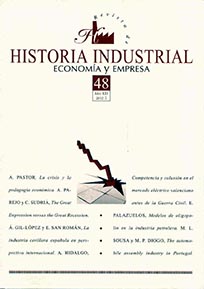Giving with one hand and taking away with the other: the automobile assembly industry in Portugal (1960-1988)
DOI:
https://doi.org/10.1344/rhi.v21i48.20852Keywords:
Automobile, Industrialisation, Industrial Policy, International Transfer of TechnologyAbstract
The automobile industry in Portugal has its foundation in 1961, with the Assembly Law, which imposed limitations upon the importation of vehicles and created a very specific geometry of interests very much influenced by commercial interests. In order to comply with this law, manufacturers were forced either to create local affiliated companies or to concede assembly licenses to local agents. In spite of the 20 assembly plants which were built during the 1960s and 1970s, there was never a dynamic assembly sector. The capacity to absorb technology in this sector was modelled by the receptor environment, which was unable to appropriate new machinery and new skills, and remained at a handling level. The late industrialisation, the almost complete absence of engineers working in this sector and the severe lack of qualified workers made importation of technology the only available possibility. In this article we present two case studies, Movauto and Salvador Caetano/DFO, which highlight the characteristics of the Portuguese automobile industry, mainly concerning its business strategy and technology transfer channels.Downloads
Downloads
Published
How to Cite
Issue
Section
License
El/la autor/a cede los derechos al/la editor/a. Creative Commons
El/la autor/a que publica en esta revista está de acuerdo con los términos siguientes:- El/la autor/a cede en exclusiva todos los derechos de propiedad intelectual al/la editor/a para todo el mundo y toda la duración de los derechos de propiedad intelectual vigentes aplicables.
- El/la editor/a difundirá los textos con la licencia de reconocimiento de Creative Commons que permite compartir la obra con terceros, siempre que éstos reconozcan su autoría, su publicación inicial en esta revista y las condiciones de la licencia.





